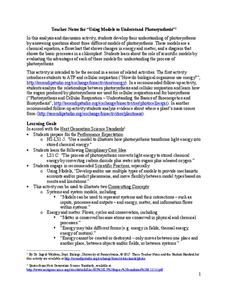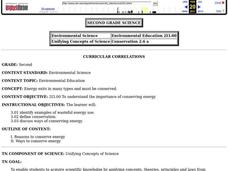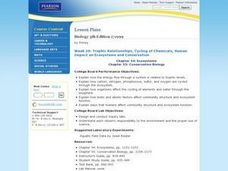Teach Engineering
Bouncing Balls
How high will it bounce? Groups determine the height different balls bounce off of different surfaces. By performing the necessary calculations, they determine the initial and final momentum of the balls. The included worksheet provides...
CK-12 Foundation
Loop-the-Loop
What prevents a roller coaster from falling when it goes upside down? Scholars experiment with a roller coaster simulation controlling the mass of the coaster, the height of the hill, and the radius of the loop. They learn which factors...
CK-12 Foundation
Roller Coaster
Roller coasters rely on both kinetic and potential energy, but how much total energy does a roller coaster need? Scholars vary the mass of a coaster and the height of the initial hill. Graphs showing the types of energy and total energy...
University of Texas
Lives of Stars
Stars exist from a few million years to over 10 billion years, depending on their mass. Scholars perform a play acting as stars to learn about their different life cycles. They develop an understanding of many of the fundamental concepts...
CPO Science
Physics Skill and Practice Worksheets
Stop wasting energy searching for physics resources, this comprehensive collection of worksheets has you covered. Starting with introductions to the scientific method, dimensional analysis, and graphing data, these skills practice...
American Chemical Society
Controlling the Amount of Products in a Chemical Reaction
Everyone enjoys combining baking soda and water. Here is a lesson that challenges scholars to analyze the reaction three different ways — the real substances, the chemical equation, and the molecular models. Class members experiment to...
Serendip
Using Models to Understand Photosynthesis
Is your class in the dark about photosynthesis? Shed some sunlight on an important biological process with a thoughtful activity. After answering questions to help determine their level of knowledge, learners work with chemical equations...
Curated OER
Energy Conservation
Class is divided into groups of 2-4 students. They then are given a list of 36 items that are found in our homes and which use electricity. They are going to pretend that because of an energy shortage, they have to pick only twelve items...
Curated OER
Trophic Relationships, Cycling of Chemicals, Human Impact on Ecosystems and Conservation
Learners explore how the energy flow through a system is related to trophic levels. They investigate how organisms affect the cycling of elements and water through the biosphere. Students participate in lab activities to observe ways...
Curated OER
Power and Conservation vs. Non-Conservative Forces
For this power worksheet, 12th graders solve four problems including calculating work done by friction, determining work done by gravity and the calculating the minimum horsepower needed to save a ship that is sinking.
Curated OER
Unit IX: Worksheet 2 - Impulsive Force
Here are nine motion problems for physics fanatics to solve. Topics are pretty typical: rifles firing bullets, freight train cars colliding, astronauts gliding through space, balls being thrown. Pupils compute recoil speed, combined...
Physics Classroom
Law Enforcement - Explosions
How do law enforcement officers determine the strength of an explosion based on the movement of objects around the point of origin? Scholars inspect the relative mass and velocities of two cars before and after an explosion. They perform...
Polar Trec
What Is My Footprint?
How do one's habits and lifestyle choices affect the environment? Through a short online survey, learners will calculate their own carbon footprints then determine how to reduce their impact on the environment through simple steps, such...
Science Matters
Peanut Energy
How do humans get energy since they aren't mechanical and can't photosynthesize? Learners explore this question by relating potential energy in food to human energy levels. Scholars measure the change in mass and a change in temperature...
CK-12 Foundation
Ballistics Tests
How did scientists measure the speed of incredibly fast things before the invention of high-speed photography? Scholars virtually perform ballistics tests to discover the process. They control the rifle type, bullet mass, and target...
CK-12 Foundation
Bumper Cars
Is the transfer of energy different in bumper cars with stable versus bouncy bumpers? One of the variables explored in the simulation is bumper type; other variables are the mass and velocity of each car. This allows pupils to see the...
CK-12 Foundation
Collisions
Is momentum conserved in a collision, along with energy, or are they opposing forces? Pupils vary the mass and velocity of two bumper cars along with the type of bumper in order to answer this question. Worksheet and in-simulator...
Physics Classroom
Law Enforcement - Hit-and-Stick Collisions
How do police determine the speed of a car that has hit a stopped vehicle? Scholars determine the momentum of the car system both before and after a collision. They identify instances where the law of conservation of momentum appears to...
Beyond Benign
Stoichiometry Challenge
Have you been searching for environmentally friendly chemistry experiments to use in your high school laboratory? This stoichiometry experiment replaces a conventional aluminum to alum lab by using sodium carbonate and calcium chloride...
Cornell University
Polymers: Instant Snow
Is it easy to make snow? Scholars use critical thinking skills as they investigate the concept of polymers by making snow. The class tests several different variables and takes measurements over the course of several days. They then...
Mr. E. Science
Energy and Power
Teens often display potential energy in class and kinetic in the hallways. This third presentation covers the six types of energy, each in potential and kinetic form. It also covers the Law of Conservation of Energy and Einstein's Theory...
Curated OER
Perpetual Motion
Young scholars are introduced to the concept of Energy Conservation with the example of: Tony Hawk seems to defy the conservation of energy as he keeps reaching new heights on each pass on the halk-pipe. Actually, Tony is supplying the...
Curated OER
Marbles and Momentum
Students examine the law of conservation of momentum. In this physics lesson, students play marbles in order to compare the mass of the marble and velocities effects. Students receive directions of the marbles game and collect data while...
Curated OER
What is Momentum?
In this momentum worksheet, students will complete two fill in the blank statements on inertia and momentum. Then students will compare the momentum of a bowling ball and baseball with differing masses and velocities in 3 short answer...
Other popular searches
- Law of Conservation of Mass
- Conservation of Mass Labs
- Conservation of Mass Law
- Conservation of Mass Water
- Conservation of Mass Lesson

























